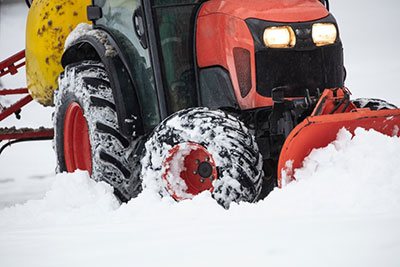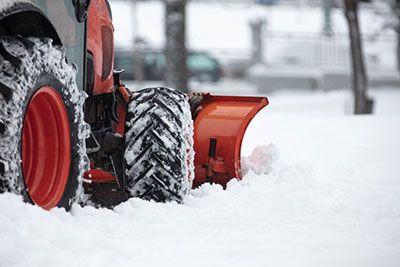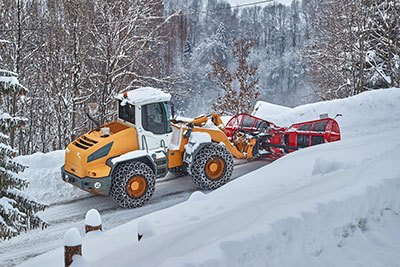Are you an agricultural worker in need of some sound advice for preparing your tractors for the cold winter months ahead? Well, you’ve come to the right place! Winter can be tough on tractors and other farming equipment unless they are properly maintained.
In this comprehensive guide, we’ll discuss the best tips and methods to ensure that your tractor runs smoothly throughout this upcoming harsh winter season. From replacing worn-out engine parts to storing specific components away during periods of frosty weather, see how to keep a tedious chore stress-free.
Take away key points:
- Keeping your compact tractors and equipment is crucial for optimal work in spring
- Before storing your tractor, ensure all inner and outer parts are protected to avoid further complications
- Follow all maintenance steps to prepare optimal operating standards for equipment
Table of Contents
- Keeping your tractor optimal during winter
- Empty the fuel tank & use antifreeze
- Change the engine oil filter
- Keep water away from the diesel fuel supply
- Park in the warmest place possible
- Organize the proper maintenance schedules
- Guard your tractor engine with the engine coolant
- Remove the tractor battery for the long-term storage
- Check tractor tires
- FAQs
- Conclusion
Keeping your tractor optimal during winter

Various tractor maintenance procedures and steps keep your compact tractors and other farm machinery in good condition during the winter. It will save expensive repairs and function properly later.
Use the following tips to keep your compact tractors optimal in colder months.
Empty the fuel tank & use antifreeze
When you empty the fuel tank, you are preventing any excess moisture from accumulating and causing corrosion or other damage to the equipment. Maintenance also helps reduce the risk of a fuel line freezing up during cold weather.
Additionally, using antifreeze helps protect the engine by providing a protective layer against cold temperatures. The antifreeze will also help lubricate the engine and keep it running smoothly even in cold weather conditions.
By taking these steps to empty the fuel tank and use antifreeze, you can ensure that your tractor is well-maintained during winter months and ready for use when spring arrives.
Change the engine oil filter
Replacing the oil filter in a tractor is an important part of regular maintenance, especially during the winter months. The cold temperatures can cause the oil to thicken, making it difficult for it to flow through the engine and lubricate its parts. By replacing the filter, you can ensure that your tractor has clean, fresh oil that will keep it running smoothly and efficiently.
The process of replacing an engine oil filter in a tractor is relatively simple. First, you’ll need to identify your machine’s specifications and drain the old oil from the system. Then, remove the oil filter and replace it with a new one. Finally, refill the system with fresh oil and start up your tractor to make sure everything is working properly.
Regularly replacing your tractor’s engine oil filter can help extend its life by preventing wear and tear on its components. It also helps reduce emissions by keeping pollutants out of the air.
In addition to checking the engine, you must also check fluids, and grease points, and see if there is a possible risk of damage to these inner parts. Prepare the replacement parts if the air compressor, air filter, and grease filters don’t operate fully.
Ensure all of them are operating smoothly before the winter season ends, and once you store the machine in the heated garage, your compact tractor will be optimal for further use.
Taking care of your tractor’s maintenance needs during winter months will help ensure that it runs properly all year long.
Keep water away from the diesel fuel supply
First, make sure to use winter-blend diesel fuel. Fuel refineries blend winter-rated diesel fuel for colder climates to help prevent gelling. This type of fuel is designed to remain liquid at lower temperatures.
Second, add a specially designed fuel additive such as Diesel Fuel Supplement +Cetane Boost to your tank before refueling. This will help prevent gelling and protect against fuel-filter icing in diesel engines.
Third, if you live in an area with very cold winters, consider investing in a Disaster Prevention Kit like the one from SPE Motorsport or S&S Diesel Motorsport. These kits contain components that can help protect your engine and fuel filters from damage caused by CP4 pump failure due to low temperatures.
Finally, if possible, try to keep your vehicle inside when cold temperatures drop below freezing so that the fuel does not get too cold and cause gelling.
By taking these steps, you can ensure that your diesel engine runs smoothly during the winter months and avoid costly repairs due to water contamination or gelling of the fuel supply.
Park in the warmest place possible

If you don’t have enough space in the shed for your tractor, the easiest way to guard it in winter may be to park it in an open, sunny area with east-facing exposure.
This layer of protection from wind chill helps your engine start and warm up faster. When the sun rises each morning, it will be hitting the hood of your tractor, providing a warm boost for the internal tractor equipment.
Organize the proper maintenance schedules
If you can take a few minutes to idle your tractor before actually running it, you will be in good shape. Before use during the colder months, let your engine warm up for 5-10 minutes to avoid damaging components with cold fluids.
Additionally, keep an eye on your rubber components like hoses and belts that may become brittle in the cold.
Lastly, inspect your tractor tires and make sure they are properly inflated according to the tractor’s operator manual, as these are vulnerable to dry rot in winter weather.
Guard your tractor engine with the engine coolant
Antifreeze, also known as engine coolant, can save your tractor from freezing in the winter months. The proper compact tractor maintenance will extend the water pump life and minimize liner cavitation, as well as guard against corrosion.
To take engine safety devices a step further, consider adding an engine block heater. This small heater is powered by its energy source and warms up the engine block and coolant to make starting your tractor easier on cold days.
Remove the tractor battery for the long-term storage
Consider removing the battery when it won’t be in use for proper maintenance. Cold weather makes it harder to start the engine, so storing the battery someplace warm can help.
When you recharge the battery in your compact tractor, be sure to use a smart charger that will switch to float mode once the peak charge is reached. If you plan on storing your tractor for winter, consult your operator’s manual to ensure the best ways to replace the battery, and then maintain your machine for optimal use in spring.
Check tractor tires

Compact tractor tire maintenance is an important part of this process. to examine the proper inflation. Keeping tires properly inflated and clean can help prevent wear and tear. It will also reduce the risk of punctures or blowouts when the ice, snow, and winter season ends.
Additionally, inspecting your tires for signs of damage or wear can help you determine when it’s time to replace them.
FAQs
How do I protect my tractor in the winter?
Follow the steps below:
– Storage in a heated garage/apply an engine-block heater (a coolant heater) to minimize the cold weather’s effects on your engine.
– Invest in new, clean, high-quality hydraulic fluids to protect the parts of the tractor that benefit from them.
– Use a waterproof tarp if you’re keeping your tractor outdoors.
– Check the levels of antifreeze and other fluids and top them up as needed.
– Inspect all hoses and belts for signs of wear and tear and replace any that are damaged or worn out.
– Keep emergency diesel fuel additives on hand in case your tractor becomes gelled during a winter storm or cold snap.
– Make sure your battery is fully charged and insulated from extreme temperatures, if possible.
– Throw a canvas or other cover over the tractor to keep it as dry as possible when not in use.
– Keep your engine tuned up for a quick, easy start the first turn of the key each time you use it in cold weather conditions.
Can you leave a tractor outside in winter?
Yes, you can leave a tractor outside in winter, but it is important to take certain precautions to ensure that your tractor is well protected. It should be stored in a dry and temperature-stable structure such as a barn or shed. If you must store your tractor outside, position it facing the sun so that snow and ice don’t build up on it.
You may want to use a tarp or other cover to protect it from the elements. Make sure that the place where you are storing your tractor is clean and free of debris.
How do you store a diesel tractor for the winter?
Before storing, treat the fuel with a conditioner and if your diesel will be used during winter you might include a bottle of HEET.
Clean and inspect the engine, stabilize the fuel and replace fuel filters, disconnect and lubricate battery terminals, check all fluids and hoses, and add an antifreeze solution to the coolant system.
Find a cover for your tractor and store it in a temperature-controlled area with full portable fuel cans.
How to keep my tractor warm in winter?
Cover it with a tarp to help maintain a warmer temperature. Additionally, using an engine heater will help keep the oil at a warmer temperature.
Use oil designed for winter temperatures and consider installing an engine block heater. If your battery is losing power due to the cold weather, take it out of the tractor and store it somewhere warmer.
Do I need to winterize my riding lawn mower?
Yes, you should winterize your riding lawn mower. It involves draining the fuel, changing the oil and oil filter, replacing the air filter, cleaning the mower deck, and more.
Are tractors good for snow removal?
Yes, tractors are great for snow removal! Tractors can be more efficient and do a better job of clearing snow than an equivalent loader of about the same size.
They also have the advantage of being able to attach various tools, such as snow pushers, 3-point snowblowers, snow plow, and blades, which make it easier to handle different types of snow.
Conclusion
Taking the time for proper tractor winter maintenance is critical for both your safety and that of your tractor.
Besides caring for the battery, tires, engine oil, and radiator, pay attention to belts and hoses, too. These are not typically troublemakers in more temperate climates but can become problematic with cold weather.
